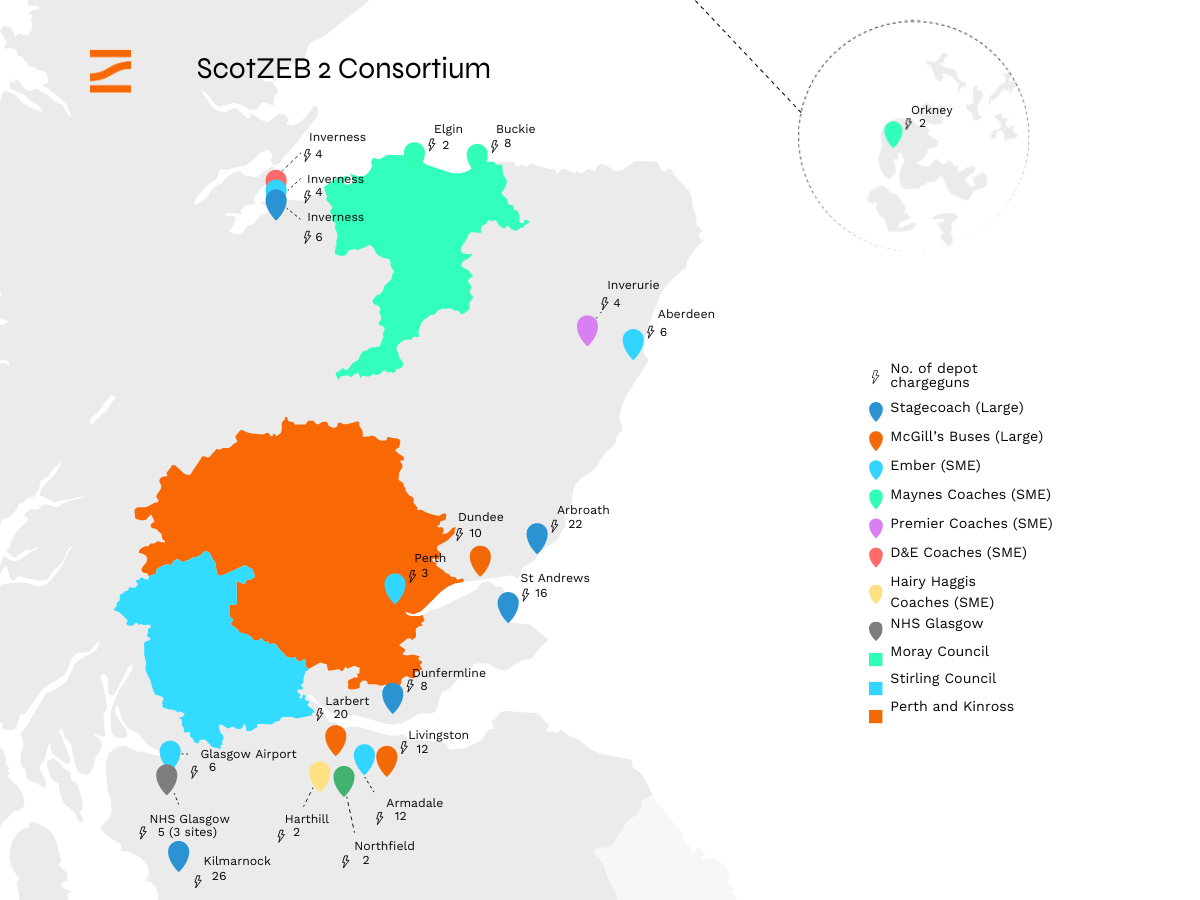Zenobē amplifies £41.7m of funding to expand electrification of buses in Scotland

Zenobē will play a lead role for a network of operators in a consortium, providing tailored financing structures to reduce both upfront and lifetime costs of electric fleet operations – while also delivering key infrastructure and ongoing support for electric vehicle operation.
23 July 2024
Zenobē, a leader in vehicle fleet electrification and battery storage innovation, today announces that it has been awarded £41.7 million, alongside a network of local fleet operators, in phase 2 of the Scottish Zero Emission Bus Challenge Fund (ScotZEB). John Swinney, First Minister of Scotland, gave the announcement at an event in Dunfermline this morning.
Zenobē will play a lead role for a network of operators in a consortium, providing tailored financing structures to reduce both upfront and lifetime costs of electric fleet operations – while also delivering key infrastructure and ongoing support for electric vehicle operation.
The funding enables eight small to medium sized enterprise (SME), mid-market and major operators to transition their fleets to zero-emission vehicles, adding more than 250 electric buses to Scotland and expanding the current number of e-buses in the nation by 40% by the end of 2026.
The grant-subsidised electrification projects will add to the 110 vehicles that Zenobē already supports in Scotland, 1,200 globally and will be delivered alongside the company’s £750m commitment to battery energy storage systems in the region.
The operators in the consortium dedicated to transforming Scotland’s electric vehicle connectivity include D&E Coaches, Ember, Hairy Haggis, Maynes Coaches, McGills, NHS GGC, Premier Coaches and Stagecoach.
The consortium has also committed to opening up their new charging infrastructure to third party fleet operators, creating a Scotland-wide rapid-charging network for use by buses, coaches and heavy goods vehicles (HGVs), significantly enhancing electrified transport connectivity across the nation.
Once in operation, it is expected that the new vehicles will collectively avoid 605,595 tonnes of CO2 emissions over their 15-year lifetime, bringing cleaner air to Scottish communities.
Phase 2 of ScotZEB differed from Phase 1 in that applicants had to cooperatively pitch as part of a consortium, under a lead applicant, rather than individual operators and local authorities.
Steven Meersman, Founder and Director, Zenobē said: “Through our ScotZEB subsidised and Zenobē financed projects, we will support a variety of operators across Scotland to make the switch from diesel to electric. The consortium brings together family-owned coach companies, well established bus operators, an innovative electric bus start-up and the NHS, showing how private capital can help public funding go the extra mile. Zenobē uses unique financing solutions and operational support to demonstrate how we can accelerate the decarbonisation of transport across the nation, together.”
John Swinney, First Minister of Scotland said: “Tackling the climate crisis and eradicating child poverty are two of the Scottish Government’s main priorities, and supporting zero-carbon buses as a sustainable means of public transport across Scotland will contribute to achieving both by connecting communities and opening up economic and social opportunities.
“This investment will deliver 100 new inter-city bus routes and reduce greenhouse gas emissions by more than 600,000 tonnes over the lifetime of the fleet by encouraging more people to swap the car for efficient public transport, which is crucial role if we are to reach net zero by 2045.
“Every £1 from the Scottish Government will leverage £3.20 of private sector investment – demonstrating that our shared decarbonisation goals can be met by working together and that the private sector is now leading the way on removing carbon emissions from our bus and coach fleets.
“All bus and coach operators, including those operating in smaller towns and communities, will benefit from both the novel approach to financing and the Scotland-wide charging network that will be delivered, helping other modes of transport make the switch to electric vehicles too.”
Pierce Glennie, Co-Founder, Ember said: “We’re excited to be part of the winning ScotZEB 2 consortium with Zenobē. The funding will allow Ember to roll out 100 state-of-the-art electric coaches throughout Scotland by 2026 – connecting towns, cities and villages with an affordable zero-emission transport option. The vehicles will operate from a network of ultra-fast charging hubs with 600kW chargers capable of fully-charging a coach in under an hour.”
Kevin Mayne, Operations Director, Maynes Coaches said: “We are proud to be one of the first Scottish coach operators making the transition to zero emission coaching. It has been a huge step for us as a family company, but also a great thing for the coach industry as a whole to see the inclusion of coaches in the ScotZEB fund: it shows an understanding of the important role our industry plays in reducing the number of cars on the road. We look forward to working closely with the Scottish Government, our consortium group, and Zenobē, to lead the way in the coach industry’s path to Net Zero.”
Alex Hornby, Group Managing Director, McGill’s Bus Group said: “McGill’s Bus Group are proud to have led the charge in investment in electric bus fleets and have already saved 11,270 tonnes of carbon, thanks to the investment of £55 million that has been made so far. Across Scotland, thanks to the welcome news of this latest funding round, we will soon run around 160 electric buses and 70% of our depots will benefit from complementary infrastructure. Alongside Inverclyde and Renfrewshire which now largely boast a frontline, electric bus fleet, locations like Falkirk and Stirling will now be able to experience the benefits. Our flourishing bus network in Dundee, already fully LEZ compliant, will also see nearly half of its frontline fleet become zero emission. Buses have the power to supercharge Scotland in its quest to become net zero. Here at McGill’s Bus Group, we will do all we can to ensure the potential of the sector is realised.”
Sam Greer, Chief Operating Officer, Stagecoach said: “We are excited to be working with Zenobē in this innovative partnership to speed up transport decarbonisation and deliver our shared climate ambitions. Only by leveraging each other’s strengths will we be able to achieve our challenging net zero targets and build a world-class decarbonised supply chain. We are grateful for the support of the Scottish Government announced today and look forward to working with our partners to bring new greener, cleaner vehicles to towns and cities across Scotland.”
ENDS
Press Contact: zenobemedia@stonehaven.uk.com
NOTES TO EDITOR
A list of the operator consortium members:
- D&E Coaches
- Ember
- Hairy Haggis
- Maynes Coaches
- McGill’s Buses
- NHS GGC
- Premier Coaches
- Stagecoach
About Zenobē Energy Ltd. (Zenobē):
Zenobē is an EV fleet and grid-scale battery storage specialist, headquartered in the UK. The company began operations in 2017 with three founders and has since increased its staff to >250 FTEs with a wide range of leading skills including electrical engineering, software development, computer sciences and financing.
Zenobē has around 25% market share of the UK EV bus sector and supports over 1,200 electric vehicles globally. The company is the largest owner and operator of EV buses in the UK, Australia and New Zealand.
It now operates in Europe and Australasia and is expanding into North America. Zenobē has 735MW of battery storage in operation or under construction with another 900MW of projects in advanced development in the UK which equates to circa 20% market share forecast by 2026. .
For more information, please visit www.zenobe.com/ or follow on LinkedIn.
